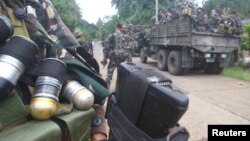Two Germans who were held for six months in the southern Philippines by suspected members of a notorious group formerly tied to al-Qaida were released late Friday. The military is stepping up operations against Abu Sayyaf, but a ransom payment was key.
The Armed Forces of the Philippines says Stefan Viktor Okonek and Henrike Dielen have arrived in Manila, and are now in the care of the German Embassy after police found them last night in Patikul, Sulu.
The military says they were freed because of “intensified law enforcement operations.” Armed Forces Spokesman Harold Cabunoc says members of the Abu Sayyaf group had been complaining about the military presence on their perimeter.
“The intent was to pressure them, while at the same time we were also very careful because we would not like to intimidate them or to agitate them into beheading the hostages,” he said.
But a spokesman for Abu Sayyaf announced on a local radio station late Friday the group had received the $5.6 million ransom it demanded and so the hostages were released.
Cabunoc says the Philippine government “does not negotiate with terrorists” and that he had no knowledge of any ransom payment.
Earlier this month, the group announced it would behead one of the German captives Friday if the ransom was not paid. Several reports say the Abu Sayyaf also demanded that Germany withdraw its support of the United States' airstrikes against Islamic State fighters in the Middle East.
The Abu Sayyaf took Okonek and Dielen hostage in April as they sailed off Palawan province toward Sabah, Malaysia. They were held in Jolo, an Abu Sayyaf stronghold in the tiny island province of Sulu about 950 kilometers south of Manila.
Late last month Philippine National Defense Secretary Voltaire Gazmin announced military operations would be stepped up against the Abu Sayyaf. The military says the group is holding at least a dozen hostages, including locals, Europeans and other Asians.
Cabunoc says the military’s chief of staff, General Gregorio Catapang this week visited troops in the area, which now number at least 3,000.
“To ensure the release of all 12 hostages and at the same time he reminded the troops to make sure that collateral damage would be minimized,” said Cabunoc.
The Abu Sayyaf began as a group promoting a Muslim separatist ideology and was funded by al-Qaida in the 1990s. But funding dried up and since 2000 they have gained notoriety for kidnappings, beheadings and bombings. At one point they were 1000-strong, but they have since dwindled to a few hundred.




